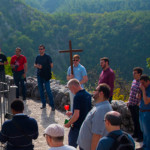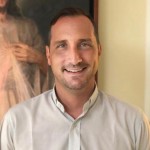The International Conference on the Theology of Human Mobility in the 21st Century, organized by the International Union of Superiors General (UISG), the Union of Superiors General (USG) and the Scalabrini International Migration Institute (SIMI), was held online September 20-22. A strong invitation to welcome Pope Francis' call.
I share with the confreres the experience I had from September 20 to 22 when I participated, in a virtual way, in the International Conference on the Theology of Human Mobility in the 21st Century. It was a very rich experience; I could not imagine the extent of the problems and the work accomplished.
Led by an intercongregational team, coordinated by the International Union of Superiors General (UISG), the Union of Superiors General (USG) and the Scalabrini International Migration Institute (SIMI), the work was developed in three aspects: biblical, theological and pastoral.
The first day focused on biblical study and the phenomenon of migration, moderated by Elizangela Chaves Dias, professor of biblical studies at the Pontifical Urbaniana University. The speakers were Nuria Calduch-Benages, professor of Old Testament at the Pontifical Gregorian University, and vănThanh Nguyễn, professor of New Testament Studies (Chicago, USA). That day also featured presentations by Fr. Pat Murphy, of the House of the Migrant, and Sister Rosita Milesi, from the Migrations and Human Rights Institute (IMDH), on the work on migration routes in Tijuana, Mexico.
 The second day was dedicated to theological reflection on migration. The moderator was Gioacchino Campese, professor of Pastoral Theology of Human Mobility at the Pontifical Urbaniana University. During this day there were lectures by Regina Polak, from the University of Vienna, and Daniel Groody, from the University of Notre Dame. Testimonies emphasizing the work of religious organizations against human trafficking and forced migration were presented by David Holdcroft, sj, a specialist in vocational and post-secondary education at the Jesuit Refugee Service, Rome, and by Yvonne Clémence Bambara of the Talitha Kum network, an organization of consecrated women working against human trafficking.
The second day was dedicated to theological reflection on migration. The moderator was Gioacchino Campese, professor of Pastoral Theology of Human Mobility at the Pontifical Urbaniana University. During this day there were lectures by Regina Polak, from the University of Vienna, and Daniel Groody, from the University of Notre Dame. Testimonies emphasizing the work of religious organizations against human trafficking and forced migration were presented by David Holdcroft, sj, a specialist in vocational and post-secondary education at the Jesuit Refugee Service, Rome, and by Yvonne Clémence Bambara of the Talitha Kum network, an organization of consecrated women working against human trafficking.
The third day involved pastoral reality, that is, concrete pastoral actions that the Church and religious congregations carry out in countries of origin, transit and arrival of migrants and refugees. Most interesting was the sharing of the inter-congregational work of the Marist and La Salle Brothers, given by Brothers Rafael Matas Roselló, General Councilor of the Brothers of the Christian Schools, and Valdícer Civa Fachi, Director of the CMI (Collaboration for Mission International) of the Marist Brothers, with the Fratelli Project in Lebanon. Also sharing was Suresh Sundram, director of research for the Cabrini Health Program for Asylum Seekers and Refugees (Melbourne, Australia). As for Suresh Sundram’s testimony, it was striking what he heard from a refugee: “in our country they kill the body, here they kill our soul”.
What sticks with me from these three days? The Conference is over, but the call of Pope Francis to welcome migrants and refugees remains, remembering that we are all “migrants and pilgrims like our ancestors” (1Cor 29:15). The Church has always taken on the burden of the suffering, but also the hopes of all men and women of all times. It is necessary to overcome the challenges of prejudice and resistance in order to nurture the hope for fraternity. To remember that, beyond statistics, migrants and refugees have faces. They are men, women and children who leave everything in search of a place to live. It is necessary to emphasize that our spirituality is grounded in the contemplation on the face of our incarnate God so we can attend to the needs we see on the faces of our brothers and sisters.
For those interested, the conferences can be found at: http://directportugues.uisg.link




